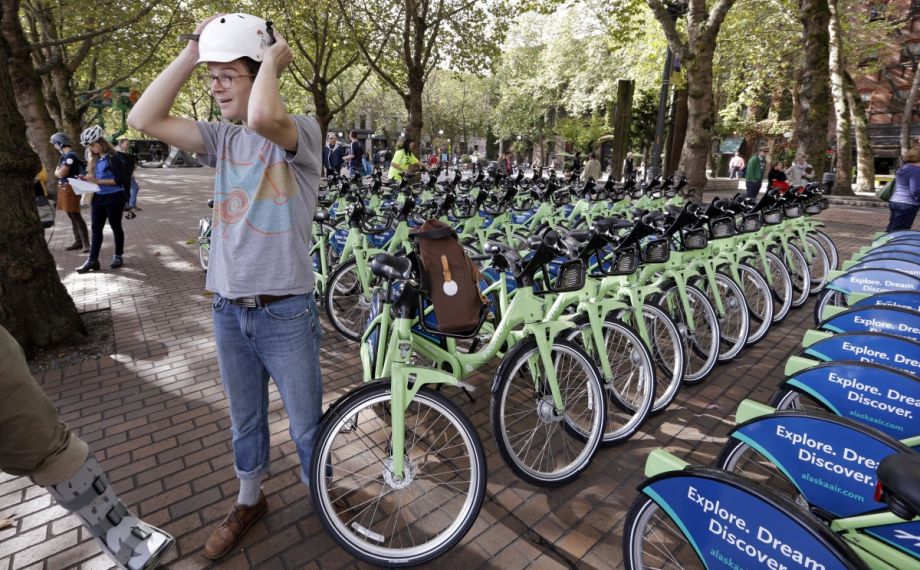Seattle’s bike-share system is in dire straits. After a little over a year of operations, Pronto turned to the Seattle City Council for a $1.4 million bailout. Without it, the system will be insolvent by the end of March and the city might be required to pay back more than $1 million in federal grants.
“At this point Pronto doesn’t have money to pay for operations moving forward. A bill would come in on March 1 that’s due March 30 and unless anything’s changed on [Pronto’s] part, I don’t think they have a way to pay that bill,” said Nicole Freedman, the director of active transportation for the Seattle Department of Transportation (SDOT), at a recent council meeting.
Freedman, other SDOT staff and staff from the City Budget Office were at City Hall to argue the case for Pronto at a Council Sustainability and Transportation Committee meeting last Tuesday. More specifically, they are asking council to partially release $1.4 million of the $5 million in the 2016 city budget allotted for bike-share expansion. The City Council put a hold on that money last fall pending a fleshed-out plan for the expansion.
If the council approves the $1.4 million request, SDOT will use the money to purchase the equipment and take ownership from Puget Sound Bike Share (PSBS), the nonprofit that launched and currently owns Pronto. SDOT’s been in talks with PSBS about acquisition since May and publicly announced the plan last fall. The money will also allow Pronto to shore up remaining debt from their capital expenditures. Council Member and Committee Chair Mike O’Brien was quick to voice concerns over the troubled finances.
“I assume we didn’t choose [this] model because we thought it’d be great to be saddled with a bunch of debt. Why are we in this situation?” O’Brien asked.
According to Freedman, the trouble started with overly optimistic projections for ridership and sponsorship growth. “Because of those [high] projections, they took out a loan to pay for the capital costs, and they’re paying for the loan with sponsorship money,” she said.
In its first year of operations, Pronto’s 54-station, 500-bike system saw 140,000 trips and sold 3,000 annual memberships.
PSBS’ former executive director Holly Houser took issue with SDOT’s framing of the problem, however. She says the nonprofit stopped seeking grants and new sponsorship money at the end of the summer in preparation for the city’s planned takeover in early fall 2015.
“The reason why the bike-share system is facing insolvency is not because the nonprofit was irresponsible with money,” Houser told the Seattle Times. “It’s because the city has had these ongoing delays in acquisition.”
That lack of ongoing fundraising, coupled with Seattle not receiving a TIGER grant that would have provided $10 million for expansion, has in part left Pronto in its current situation.
But capital debt and acquisition delays aside, it does appear Pronto’s ridership and membership numbers are typical for a system of its size. Boston’s Hubway (which Freedman helped start and ran prior to joining SDOT) launched in 2011 with 61 stations and 600 bikes. It had 3,200 members and 142,289 trips in its first year. The system has expanded every year since then and now has 140 stations, 1,300 bikes, nearly 13,000 members and sees nearly 1.2 million trips a year.
Other cities that launched with similar system sizes such as Denver and D.C. also saw significant ridership and membership growth after expanding.
Freedman is confident that Pronto could be sustainable moving forward. “If we buy the system outright tomorrow for $1.4 million, the money that comes in from user fees and memberships plus the money from sponsorship, because we have no debt, should pay for system without a subsidy,” she explained.
O’Brien seemed skeptical that SDOT had worked out all the answers.
“We’re here at phase two where we have to decide if we’re in or out on this one, without knowing what’s going to happen in the future,” he said. “… Fiscally, bike-share is at a critical step where it’s not feasible. It’s going to be critical that the second attempt is sustainable or I worry we poison the well for bike-share in Seattle in a long time.”
Nonetheless, he hinted he would likely push for a second attempt. “I believe ultimately we’re going to have one of the best bike-share systems in the world here in Seattle,” he said. “But I don’t know what the path to that is.”
If the council does approve the $1.4 million request, SDOT will take over operations immediately and begin work on an RFP for expansion. Freedman said the city could also choose not to expand and continue operating at the current system size with no further subsidy.
If there is a bailout and Pronto lives to pedal another year, there are other hurdles it must overcome. The majority of the public comments at Tuesday’s meeting were pro-Pronto, but even the supporters had suggestions for making the system better.
Ryan Packer, a Seattle resident and Pronto member “since day one,” pointed out in his testimony that, “There are no bike-share stations on the same block as transit stops. None on most bikeways. None by libraries.” Gordon Padelford, a coordinator with Seattle Neighborhood Greenways, offered a laundry list of potential improvements. They included better station location along transit routes, repealing King County’s all-ages helmet law, revising usage rates, offering electric-assist bikes and building out a safe bike network across Seattle. “Currently it’s quite harrowing to bike in Seattle’s downtown streets,” he said.
No vote was taken Tuesday because only two members of the committee were present. SDOT will return in two weeks to answer more questions before the City Council makes their decision.
The Works is made possible with the support of the Surdna Foundation.

Josh Cohen is Crosscut’s city reporter covering Seattle government, politics and the issues that shape life in the city.
Follow Josh .(JavaScript must be enabled to view this email address)

















